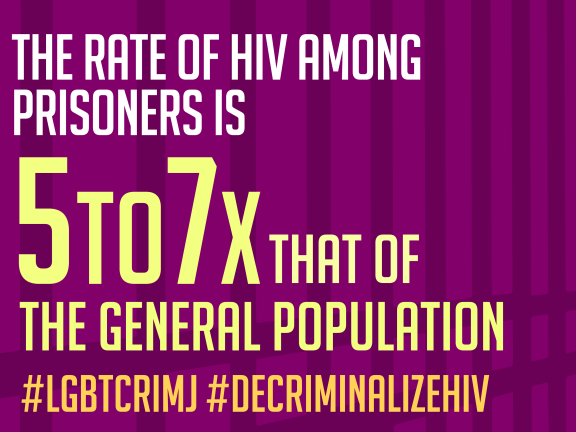White House Hosts Historic Meeting on LGBTQ People and People Living with HIV in the U.S. Criminal Justice System (2016)

September 20, 2016 (Washington, DC) — Today the White House hosts 150 formerly incarcerated LGBTQ people, policymakers & advocates to discuss unique challenges faced by lesbian, gay, bisexual, transgender and queer (LGBTQ) people and people living with HIV (PLHIV) in the criminal legal system.
White House officials in attendance include Ashley Allison, Deputy Director of Public Engagement and Senior Policy Advisor; Roy Austin, Deputy Assistant to the President for Urban Affairs, Justice and Opportunity, White House Domestic Policy Council; Michael Botticelli, Director of National Drug Control Policy; and Raffi Freedman-Gurspan, Senior Associate Director for Public Engagement, the first openly transgender White House appointee.
Formerly incarcerated individuals participating in the meeting include:
- Monica Jones, a Black transgender woman who successfully fought profiling for prostitution-related offenses in Phoenix;
- Ashley Diamond, a Black transgender woman who successfully sued the Georgia Department of Corrections for denial of medical care, resulting in system-wide changes in the treatment of transgender people in that state;
- Robert Suttle, a Black man living with HIV who was convicted and incarcerated under an HIV-specific statute in Louisiana;
- Evie Litwok, a formerly incarcerated lesbian who founded Witness to Mass Incarceration, an organization dedicated to documenting the experiences of incarcerated LGBTQ people upon her release;
- Joe Booth, an activist and formerly incarcerated individual and sexual abuse survivor from California working to end the crisis of sexual abuse in detention with the group Just Detention.
Together with legal, advocacy and Administration leaders, they are discussing discriminatory policing and other factors driving LGBTQ people into the criminal legal system. These issues include HIV criminalization, youth homelessness, and high rates of poverty and discrimination against LGBTQ people, as well as conditions of confinement in federal prison, and HIV and health issues. Experts are presenting cutting edge research, innovative programs from around the country, and policy recommendations. CHLP Executive Director Catherine Hanssens is moderating a panel on the fight for safety and dignity for people who are LGBT and/or living with HIV in prison.
LGBT people comprise roughly 4% of the U.S. population yet recent federal data show that 8% of people in prisons identify as LGBT. Research reveals particularly high rates of incarceration among LGBTQ people of color, people with HIV, and transgender people. In the U.S., 32 states have HIV-specific criminal statutes.
“Roughly one in seven people living with HIV pass through a correctional or detention facility every year and generally do not receive health care that meets public health standards. It is critical to have these conversations that address the need for healthcare interventions and prevention efforts in correctional settings for people living with or at risk for HIV,” said Mayo Schreiber, CHLP Deputy Director.
A national survey of LGBT people found that three quarters of respondents had interactions with law enforcement in the previous five years. Of these, a fifth experienced police misconduct, including profiling, false arrests, verbal or physical assault, or sexual harassment or assault.
“Racial profiling, abusive police officers, mass incarceration, and inhumane prison conditions are hurting our community. I am thankful that we are having these important conversations and that my experiences and ideas–and those of other people who have been arrested or gone to prison–are being included in a real way,” said Ashley Diamond.
Among the national trends discussed today, 20% of youth in the juvenile justice system identify as LGBT (with 85% of those being youth of color) compared to only 7-9% of all U.S. youth. “Because there is a disproportionate risk of criminal legal involvement and detrimental health outcomes facing LGBTQ youth, it is important that we continue to advocate that justice for system-involved youth includes comprehensive, medically accurate, and queer-affirming sexual health care and sexual health literacy programming from culturally competently staff,” said Pepis Rodriguez, TeenSENSE Project Coordinator at CHLP.
ABOUT THE LGBT/HIV FEDERAL CRIMINAL JUSTICE POLICY WORKING GROUP
The LGBT/HIV Federal Criminal Justice Working Group (hereafter the Working Group) is a network of nearly 50 organizations and individual stakeholders working to reduce the unique harms of the U.S. criminal legal system experienced by LGBTQ+ people and people living with or at risk of HIV (PLHIV) through research, education, and policy advocacy at the federal level. Recognizing that the vast majority of LGBTQ+ people and PLHIV adversely affected by the criminal legal system are LGBTQ+ and PLHIV of color and low income LGBTQ+ people and PLHIV, the Working Group is committed to approaching issues of policing, punishment and criminalization through a racial, economic and reproductive justice framework. The Working Group was launched in 2014 after an 18-month participatory policy development process which produced A Roadmap for Change: Federal Policy Recommendations Addressing the Criminalization of LGBT People and People living with HIV.